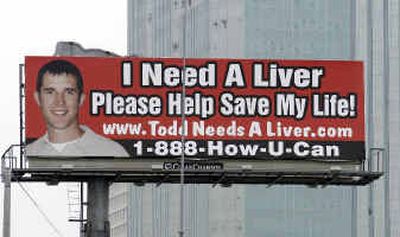Transplant network discourages donor ads

WASHINGTON – The national organ transplant network is asking hospitals to discourage patients from advertising for donors and, if possible, to refuse to perform transplants that arise from these campaigns.
Patients should wait their turn in line, the network says.
The move puts the United Network for Organ Sharing, which matches waiting patients with donated organs, on record against public solicitation aimed at helping a particular person.
It comes after a Houston man, Todd Krampitz, bought a pair of billboards and gave a series of media interviews soliciting a liver donor. It worked: Someone died, and the person’s family had heard about Krampitz and opted to donate directly to him.
Normally, when people die their organs go to whoever is at the top of the waiting list, determined by many factors including who would obtain the greatest medical benefit from a transplant, who would die soonest without one, the locations of the patient and donor.
“There’s integrity to that. That process is public, it’s transparent, it’s accountable,” said Dr. Mark Fox, chairman of the network’s ethics committee.
More than 87,000 people are awaiting organ transplants, and more than 6,000 die each year while on the list.
With Krampitz’s success, and attempts by others to emulate it, experts fear that a system designed to treat all patients fairly is being undermined.
The network’s action, approved on Thursday, 32-1, was the first official condemnation of this practice. But the statement is not part of the network’s official set of policies, and hospitals that might ignore it face no adverse consequences.
That’s partly because these sorts of “directed donations” are legal in many states, and the network feared a strong policy statement could have set up conflicts, Fox said. He said those laws were written assuming that families would donate to patients they happened to know, not to someone they read about on a billboard.
The statement is meant to offer hospitals guidance, Fox said. It advises doctors and others involved in transplantation to “reinforce” to the patient or donor family that the “system is designed to allocate organs equitably.” If the people involved insist on a directed donation, it says hospitals should “act foremost to ensure equity within the transplant system, with additional consideration of relevant facts, ethical guidelines and applicable laws and allocation policies.”
Even without teeth, the new policy is a step forward, said Arthur Caplan, a bioethicist at the University of Pennsylvania who has warned that these donations undermine the system.
“It’s absolutely a shot across the bow to every transplant program and transplant surgeon,” he said.
Similar ethical questions arise from a new trend among those looking for organ donations from the living. There, savvy patients are going beyond the traditional donors – friends and family – and soliciting kidneys and pieces of liver, often over the Internet, from strangers willing to donate. Ethicists argue these stranger donations should go to the next patient in line.
Todd Krampitz’s success has bred copycats. A billboard in Los Angeles pleads, “Our grandpa needs a liver … Can you help?” with a toll-free number and a Web site. A Bakersfield, Calif., billboard makes a similar plea.
And at least a dozen patient Web sites have arisen. Among them: KenNeedsALiver, JoeNeedsALiver, MichaelNeedsALiver, EveretNeedsALiver and MyDaddyNeedsALiver.
Attempts by e-mail and telephone to reach Krampitz were unsuccessful.
When the California billboards appeared, the local organ bank surveyed its network of patients and donor families to see what they thought of it, said Tenaya Wallace of One Legacy, which serves seven Southern California counties. The response was mixed. Some supported anything that got people to think about organ donation; others thought it was “completely unfair,” she said.
“We walk a very fine line between the two,” she said.